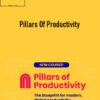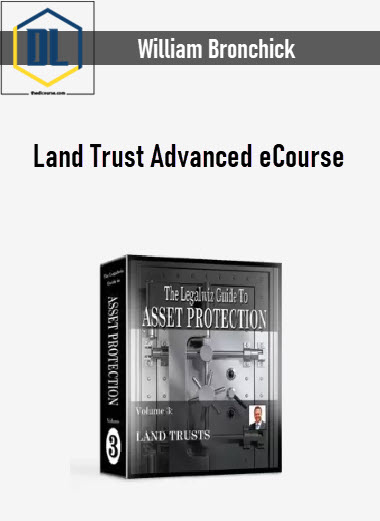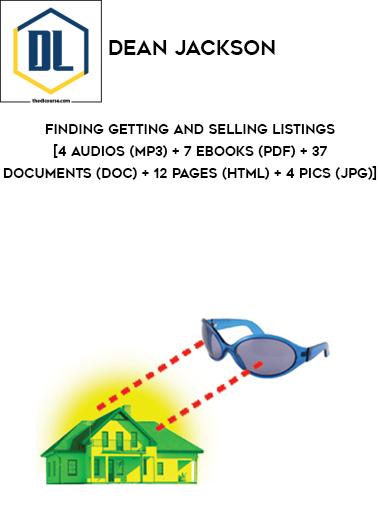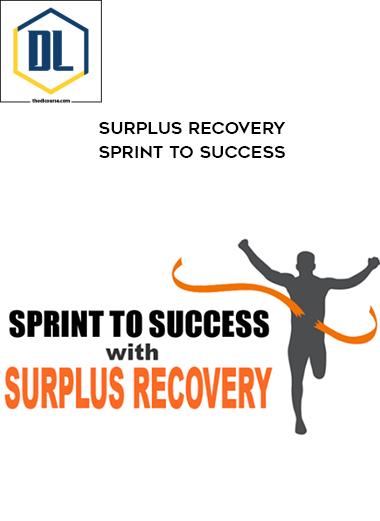William Bronchick – Land Trust Advanced eCourse
$397.00 Original price was: $397.00.$28.00Current price is: $28.00.
Total Sold: 1
Delivery: Instant Delivery
William Bronchick – Land Trust Advanced eCourse
Get That Property Out of Your Name! Use Land Trusts for Privacy & Protection
Dear Entrepreneur and Potential Multi–millionaire,
Do you own real estate in your own name or an LLC? If so, you are a sitting duck for tenant lawsuits, the IRS and code enforcement. Whether you own in your own name or an LLC, the information is public about who’s behind the ownership of your properties, and that makes it difficult to keep anonymity from your tenants and code enforcement officers. Your properties are subject to inquiries, lawsuits, and asset searches. In short, you are naked in a world of information – unless you use a little-known device… “the land trust”.
Your Odds of Being Sued Are GREATER Than EVER!
Lawsuits are an everyday threat to your financial well–being. Imagine a thug sticking a .357 magnum up to your throat and demanding you turn over your wallet, credit cards, jewelry, and keys to your luxury car. How do you feel? Scared out of your mind? Vulnerable? Violated? You will feel exactly the same way (and maybe worse) when you are hit by a lawsuit and you know you haven’t done anything wrong!
I will teach you the skills you need to protect yourself from being a target for the “bloodsuckers” and “ambulance chasers.” With impenetrable walls of protection around you, lawyers and greedy plaintiffs won’t be able to touch you or your assets!
WATCH OUT – The Lawyers Have Their
Targets on Real Estate Investors!
The National Consumer Law Center recently published a report called “Dreams Foreclosed – The Rampant Theft of Americans’ Homes Through Equity–Stripping Foreclosure ‘Rescue’ Scams”. It is a one–sided, wildly exaggerated attack on foreclosure investors that was funded by a left–wing “Consumer Protection” organization.
These are the same type of lawyers who sue McDonald’s for making people fat and sue the tobacco companies for causing cancer. Guess what? There are lawyers all over the Country with the same “consumer protection” delusion who are going after real estate investors, and you do NOT have to be one of them! I will teach you how to protect yourself from these opportunists with land trusts!
Not Convinced? Here’s 5 More Good
Reasons to Hold Real Estate in a Land Trusts:
1. Protection from liens. Real estate titled in a trust name is not subject to liens against the beneficiary of the trust. For example, if you are dealing with a seller in foreclosure, a judgment holder or the IRS can file a claim against the property in the name of the seller. If the property is titled into trust, the personal judgments or liens of the seller will not attach to the property.
2. Protection from title claims. If you sign a warranty deed in your own name, you are subject to potential title claims against you if there is a problem with title to the property. For example, a lien filed without your knowledge could result in liability against you, even if you purchased title insurance. A land trust in your place as seller will protect you personally against many types of title claims because the claim will be limited to the trust. If the trust already sold the property, it has no assets and thus limits your exposure to title claims.
3. Discouraging Litigation. Let’s face it, people tend to only sue others who appear to have money. Attorneys who work on contingency are only likely to take cases which they can not only win, but collect, since their fee is based on collection. If your properties are hard to find, you will appear “broke” and less worth suing. Even if a potential plaintiff thinks you have assets, the difficult prospect of finding and attaching these assets will discourage litigation against you.
4. Protection from HOA Claims. When you take title to a property in a homeowner’s association (HOA), you become personally liable for all dues and assessments. This means if you buy a condo in your own name and the association assesses an amount due, they can place a lien on the property and/or sue you PERSONALLY for the obligation! Don’t take title in your name in an HOA, but instead take title in a land trust so that the trust itself (and thus the property) will be the sole recourse for the homeowner’s association’s debts.
5. Making contracts assignable. The ownership of a land trust (called the “beneficial interest”) is assignable, similar to the way stock in a corporation is assignable. Once property is titled in trust, the beneficiary of the trust can be changed without changing title to the property. This can be very advantageous in the case of a real estate contract that is non-assignable, such as in the case of a bank-owned or HUD property. Instead of making your offer in your own name, make the offer in the name of a land trust, then assign your interest in the land trust to a third party.
What You’ll Learn In Land Trust Advanced eCourse?
- How to remove your name from public records and get the privacy you and your family deserve!
- How to protect your real estate from judgments & liens
- How to buy and sell real estate with complete anonymity
- How to protect yourself from title claims
- How to “assume” loans without personal recourse
- How to avoid probate of your real estate assets by “stacking” a land trust with a living trust
- Creative ways to use a land trust as part of a 1031 Tax–Deferred Exchange
- How to buy & sell real estate without title insurance or “closings”
- How to use a land trust to circumvent the “due–on–sale” provision of a mortgage or deed of trust
- How to use personal property trusts to keep your bank accounts, automobiles, mobile homes and other personal property private
- How to integrate your estate planning living trust with a land trust
- Five creative ways to use land trusts as a real estate investor
- How to use a land trust as a security device on real estate transactions
- How to fill out all the paperwork yourself to setup and use land trusts and personal property trusts – without expensive attorney’s fees!
More courses from the same author: William Bronchick
Related products
Instant Delivery
Josh Altman & Cody Sperber – Your First Million in Real Estate
Real Estate
Instant Delivery
Total sold: 1
Instant Delivery
Instant Delivery
Total sold: 1
Instant Delivery
Instant Delivery
Instant Delivery
Jack Bosch – Land Profit Generator (Home Study Course) [Real Estate]












![Jack Bosch – Land Profit Generator (Home Study Course) [Real Estate]](https://thedlcourse.com/wp-content/uploads/2020/06/Jack-Bosch-–-Land-Profit-Generator-Home-Study-Course-Real-Estate.jpg)